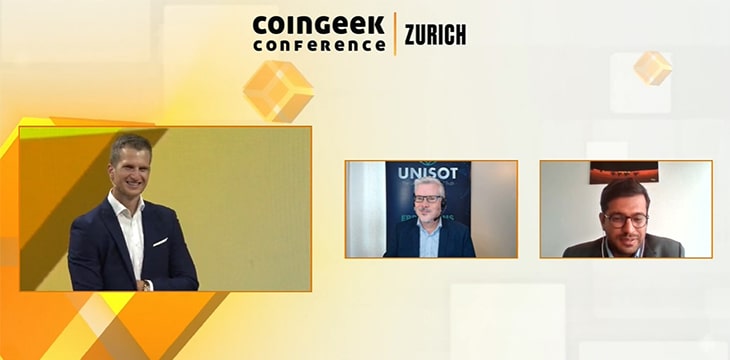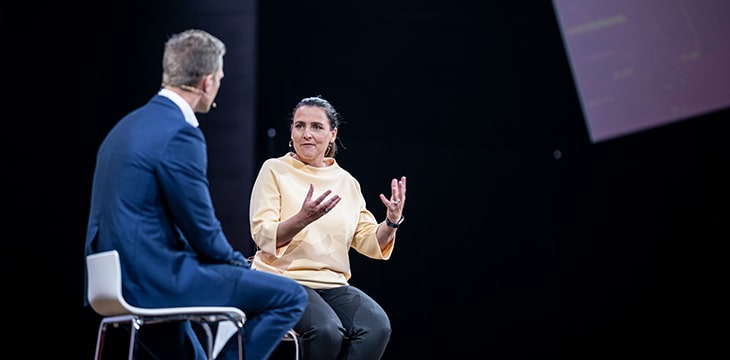
The most important impediment to blockchain-based enhancements within the international provide chain isn’t know-how, it’s getting corporations to belief each other.
The primary day of the CoinGeek Conference in Zurich noticed Bitcoin Affiliation’s Europe & Operations Supervisor Patrick Prinz host a panel on Provide Chain, Product Provenance & Blockchain. Becoming a member of Prinz have been PwC Europe’s Blockchain Lead Husen Kapasi, IBM Companies Switzerland’s Blockchain Follow Chief Tatjana Meier, and UNISOT co-founder and CEO Stephan Nilsson.
There’s no query that industries are beneath elevated stress to enhance their provide chains, for causes starting from effectivity to social accountability. Prinz famous that Germany just lately handed the Lieferkettengesetz (Provide Chain Act), which can impose strict new circumstances on corporations as of January 2023.
IBM’s Meier cited a number of initiatives she was concerned in that have been within the strategy of adjusting to the brand new guidelines, together with one within the textile {industry}, which has lengthy been affected by reputational points involving sustainability, water consumption, youngster labor, and so forth. Germany’s new Act requires corporations to know the trail their merchandise have taken, not simply trying again one step alongside that path however all the way in which again to the supply.
Meier added that elevated stress was coming not solely from regulatory our bodies but additionally from customers. The COVID disaster has bolstered customers’ wishes to know the trail taken by the merchandise coming into their houses, in addition to their willingness to pay extra for merchandise that could possibly be thought of well-sourced.
Requested the place he sees the benefits of blockchain/distributed ledger or database options, PwC’s Kapasi famous that blockchain doesn’t change current databases, it’s complementary know-how. Blockchain helps join the dots, accumulating and linking knowledge from totally different methods to create a single supply of reality.
Requested why UNISOT had chosen to construct its provide administration platform on BSV, Nilsson stated his 20-year expertise engaged on enterprise-level purposes had taught him that solely a blockchain with enterprise-level capabilities—scalability, safety and cost-efficiency—would match UNISOT’s necessities. After testing different blockchains, together with Ethereum, Hyperledger, EOS and others, Nilsson stated solely BSV made the grade.
Excessive hurdles
Meier stated it was roughly routine that potential purchasers declare to know blockchain, however urgent them for particulars exposes the truth that they actually don’t know what they’re speaking about.
As an example, sustainability managers typically categorical considerations about blockchains consuming huge portions of vitality, which exhibits they’ve confused the vitality consumed by Bitcoin miners with blockchains that don’t depend on a Proof of Work consensus mechanism.
A good higher misunderstanding is that each one data on a public blockchain is publicly obtainable. Nilsson notes that we now have a public web that everybody can entry, however all of us use that very same web to hook up with our respective banks/hospitals/and so forth. by safe, top-layer methods. Equally, the enterprise layer of a public blockchain is permissioned and all data on that layer is securely encrypted.

Kapasi added that privateness considerations of a unique kind stay a stumbling block for a lot of corporations. Particularly, corporations are leery about transferring at present siloed knowledge onto a public blockchain which may be shared with suppliers, stakeholders and different exterior entities.
Meier agreed, citing a gathering she had a number of years in the past with 4-5 huge German retailers by which she stated the stress within the room was palpable. Corporations are sometimes too protecting of their walled gardens to return collectively to handle industry-wide issues like provide chain administration.
Kapasi stated the problem cuts each methods, as a result of many blockchain specialists lack provide chain expertise. Due to this lack of mutual understanding, many initiatives by no means get previous the prototype/pilot stage.
Kapasi added that many bigger corporations additionally attempt to run impartial blockchain packages, declining to see the problem as one in every of overarching digital transformation. Kapasi stated a lot of PwC’s profitable initiatives have taken 3-4 years to return to fruition and finally concerned every thing from synthetic intelligence to analytics to the Web of Issues.
Success tales
Of the industries that categorical probably the most curiosity in blockchain-enhanced provide chains, Kapasi stated the retail, pharma and automotive sectors have been the clear frontrunners.
Meier added that she discovered it odd that curiosity by well being care and different public sector industries was comparatively low, at the very least in bigger international locations. Meier cited regulatory considerations—such because the European Union’s Common Knowledge Safety Regulation—because the probably supply of a lot of this sluggishness. Meier famous that smaller international locations appeared extra keen to take the danger, presumably attributable to having much less established legacy methods.

Nilsson stated UNISOT’s platform supported all industries however had chosen to initially deal with the meals & beverage sector, notably on Norway’s seafood {industry}. As a result of BSV’s knowledge dealing with is so cost-efficient, UNISOT clients can retailer data on a very granular degree, right down to a single location in a warehouse and even a person truck.
UNISOT has had a busy product pipeline, releasing 9 totally different modules on high of its construction administration platform within the final two months alone. However an important growth is UNISOT’s blockchain knowledge interchange (BDI), which Nilsson says addresses the largest downside he’s encountered in his 20 years as an data architect: bettering how corporations trade data. If BDI could make knowledge trade safer and extra price environment friendly, maybe that elusive aspect of belief received’t be far behind.
New to Bitcoin? Take a look at CoinGeek’s Bitcoin for Beginners part, the last word useful resource information to study extra about Bitcoin—as initially envisioned by Satoshi Nakamoto—and blockchain.





 Bitcoin
Bitcoin  Ethereum
Ethereum  Tether
Tether  Solana
Solana  USDC
USDC  XRP
XRP  Lido Staked Ether
Lido Staked Ether  Dogecoin
Dogecoin  Toncoin
Toncoin
Be the first to comment